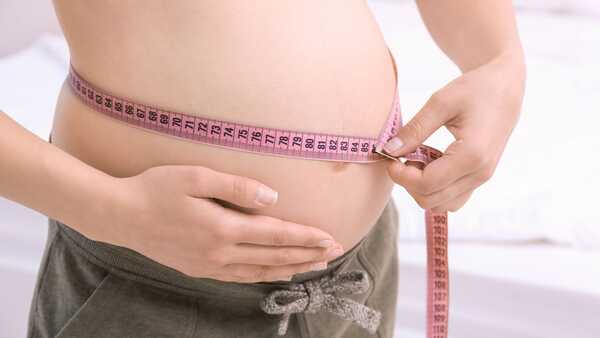
Michelle Baynham
25 May 2023
Pregnancy is a beautiful journey for any woman, but it can be challenging as well. One of the biggest concerns that expectant mothers have is how much weight they should gain during this period. Weight gain is a natural part of pregnancy, but it's important to know the right amount of weight to put on to ensure a healthy pregnancy for both mother and baby.
According to the NHS if you have a high BMI (over 25) before pregnancy or in early pregnancy, this can affect your health and how your baby develops. The higher your BMI the higher the risk.
According to the NHS if you have a high BMI (over 25) before pregnancy or in early pregnancy, this can affect your health and how your baby develops. The higher your BMI the higher the risk.
These risks include:
- high blood pressure and pre-eclampsia
- thrombosis (blood clots)
- gestational diabetes (diabetes in pregnancy)
This can be difficult to read but you will have extra care throughout your pregnancy to minimise these risks and have a healthier pregnancy.
If your BMI is over 30
If you have a BMI over 30 you should be referred to a dietitian for an assessment and advice about healthy eating and exercise.
You will also have:
- extra ultrasound scans to check the baby’s development
- blood pressure tests at every antenatal appointment
- a gestational diabetes test between 24-28 weeks (if your BMI is over 40 you may have this test earlier)
- a risk assessment for thrombosis (blood clots in your legs or lungs) at your first antenatal appointment, which will then be monitored throughout your pregnancy.
You may also need to have injections of low molecular weight heparin to reduce your risk of blood clots.
If your BMI is over 40
If you have a BMI over 40 there is a higher risk of complications during labour or birth. These include:
- a longer labour
- premature birth (when a baby is born before 37 weeks)
- an emergency caesarean birth
- a more difficult operation if you need a caesarean section and a higher risk of complications afterward, for example a wound infection or blood clot
- anaesthetic complications, especially with general anaesthesia
- heavy bleeding after birth (postpartum haemorrhage) or at the time of caesarean section
If your BMI is under 18.5 or under
If your BMI was less than 18.5 before you became pregnant, you may be advised to gain more weight than someone who is in the normal range.
Your midwife may refer you to the hospital antenatal clinic for extra scans to check on your baby's growth and development. You may also be referred to a dietitian to help you work on ways to eat well and gain a healthy amount of weight.
Your midwife or specialist will discuss with you what your target weight gain in pregnancy should be. This will be based on several factors, including your pre-pregnancy weight.
There are many reasons for having a low BMI. For example there might be a medical reason, such as an overactive thyroid. If you think this might be the case, talk to your midwife or GP.
Some women may have an eating disorder (or have had one in the past). It can be very difficult, but it’s important to tell your midwife or doctor if this is the case. They will be able to organise extra care during your pregnancy so you and your baby can stay healthy. Because of these risks your obstetrician and/or midwife will talk to you about the safest way and place for you to give birth. You should also be referred to an anesthetist (a doctor who specialises in pain relief) to talk about pain relief during labour.
Being affected by obesity does not always mean you will need a caesarean section but you may be more likely to have one.
Here's a breakdown of weight gain recommendations based on pre-pregnancy BMI:
- Less than 18.5 = underweight
- 18.5 to 24.9 = healthy weight
- 25 to 29.9 = overweight
- 30 to 39.9 = obese
- 40 = severely obese
It's important to note that these are general recommendations, and you should always consult with your healthcare provider to determine the appropriate amount of weight gain for your specific situation.
It's also essential to remember that not all weight gain during pregnancy is due to the growth of the baby. A significant portion of the weight gain comes from the increased size of the uterus, placenta, and other necessary pregnancy-related changes in the body. Additionally, the body stores fat during pregnancy to provide energy for breastfeeding.
While weight gain is necessary during pregnancy, it's crucial to gain weight at a healthy and consistent rate. Gaining too much weight can increase the risk of gestational diabetes, high blood pressure, and other pregnancy complications. On the other hand, gaining too little weight can increase the risk of preterm labour and low birth weight.
To maintain a healthy weight during pregnancy, you should focus on eating a balanced diet rich in fruits, vegetables, lean protein, and whole grains. You should also avoid processed foods, sugary drinks, and excessive amounts of saturated and trans fats.
Staying active during pregnancy is also essential for a healthy weight gain. It can help improve your overall health, reduce the risk of pregnancy complications, and promote a healthy weight gain. You should aim to build up to 150 minutes of moderate exercise each week, such as brisk walking, swimming, resistance training or yoga. All physical activity counts.
The Mother Fit pregnancy exercise programme is adapted for each trimester and essential for those looking to maintain an active healthy lifestyle, while gaining pregnancy weight at a steady pace.
In conclusion, weight gain during pregnancy is a necessary and natural process. The amount of weight you should gain depends on several factors, including your pre-pregnancy BMI, height, age, and overall health. Remember to focus on eating a balanced diet, staying active, and consulting with your healthcare provider to ensure a healthy weight gain for both you and your baby.

Michelle Baynham
Share this article

